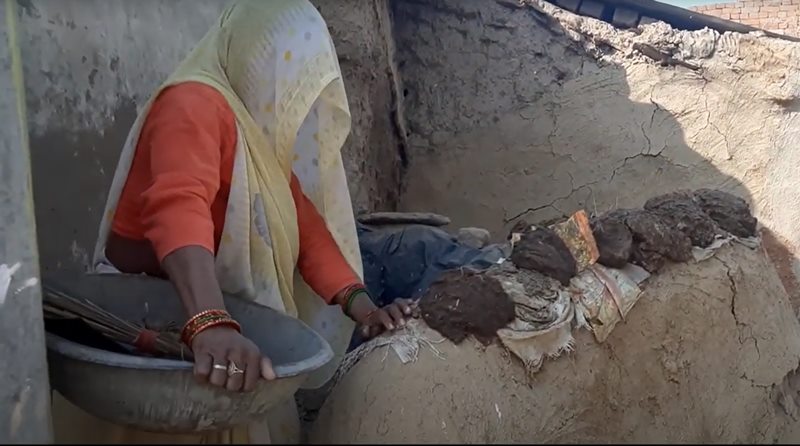30% less fund allocation for rehabilitation of manual scavengers in Budget 2022
Officially, there are slightly more than 58,000 manual scavengers in India who, despite the ban, lift human excreta. Activists working with this community say that there is a reluctance in the government to acknowledge these manual scavengers, and hence low budgetary allocations. Their rehabilitation also remains poor.


A manual scavenger in Jalaun district of Uttar Pradesh. Photo: Neetu Singh
Manual scavenging has been banned in India since 1993. However, almost thirty years later, there are at least 58,098 manual scavengers in the country, who belong to the Dalit community, and clean and lift human excreta to earn a living.
The Union Budget 2022-23 has allocated Rs 70 crore for the rehabilitation of those involved in manual scavenging under the Self Employment Scheme for Rehabilitation of Manual Scavengers (SRMS). This is 30 per cent less than the last year’s budget allocation of Rs 100 crores (which was revised to Rs 43.31 crores).
Upset with the low allocations, Bezwada Wilson, National Convener of Safai Karmachari Andolan, a movement for elimination of manual scavenging, in a tweet, said: “Allocation for SRMS is constantly reduced in successive budgets, to the tune of 30 crores again this year. Persons engaged in scavenging have been constantly denied their rights. We don’t need showering of flowers on us but the right to dignity through proper share in the Budget 2022.”
The Prohibition of Employment of Manual Scavengers and Their Rehabilitation Act 2013, absolutely bans manual scavenging in the country. The law provides for the rehabilitation of manual scavengers. It directs the setting up of district and state level survey committees to identify those who are into manual scavenging, and provide them links to employment.
Under the Act, every manual scavenger who gave up scavenging is entitled a sum of Rs 40,000 to help him or her with expenses for six months. Meanwhile they would be given skill training and made employable for other jobs. Easy loans up to the sum of Rs 10 lakhs would be available to them. They would receive a monthly stipend of Rs 3,000 for up to two years and even their dependents would get access to skill-training programmes.
Experts working to eradicate manual scavenging practice believe there is reluctance from the government to acknowledge that there are manual scavengers, and hence low budgetary allocations.
“Deliberately, the governments are undercounting, they are not recognising manual scavengers in the country, they are denying funds, as a result numbers are not as high as they should have been,” Siddharth Joshi, who works with Safaikarmachari Kavalu Samithi, an organisation working for the rehabilitation of persons engaged in manual scavenging in Karnataka, told Gaon Connection.
“Procedures for rehabilitation are also cumbersome. In Karnataka, rehabilitation for manual scavengers, who were identified in 2013, is still going on. Meanwhile, they continue to do this work [cleaning human excreta],” said Joshi. “Implementation of the rehabilitation scheme is a big issue. Scheme is not working at all and that is why it is reflecting in fewer funds,” he added.
UP is home to highest manual scavengers
As of December 2021, the Ministry of Social Justice & Empowerment had identified 58,098 manual scavengers across 17 states and Union Territories in the country. Uttar Pradesh has the maximum manual scavengers at 32,473, followed by Maharashtra at 6,325, Uttarakhand at 4,988, Assam at 3,921 and Karnataka at 2,927.
Activists blame government apathy for low allocations. “This government is working for only selected people. Why would it work for Dalits? Governments are not ready to accept that there are manual scavengers in villages, which is not true. In UP, there are maximum manual scavengers,” Badan Singh, convenor, Sanyogi Gramin Vikas Evam Sodh Sansthan, a non-profit which works for health, women safety, employment issues of marginalised communities in Uttar Pradesh, told Gaon Connection.
“Most of these workers are women, who fear that they would be penalised along with those who are forcing them to do it,” he added.
In December 2020, Gaon Connection did a series on Women Scavengers in Swachh Bharat. This three-part series showed that while many who received the compensation have left manual scavenging, they face a severe livelihood crisis. People belonging to these communities are landless, have no other means of employment and their children have poor access to education due to untouchability.

